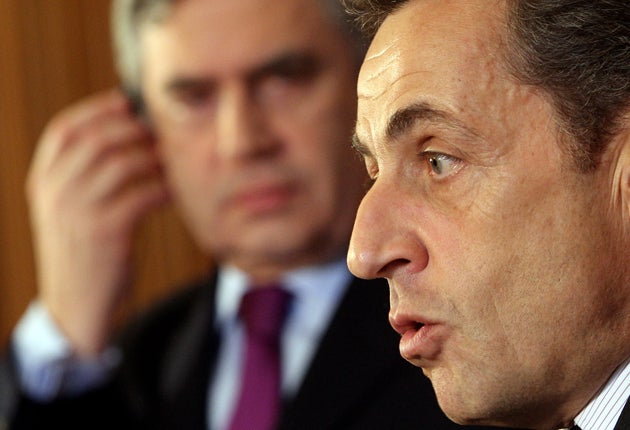Embattled Sarkozy facing new blow at hands of French voters
Socialists tipped to replace centre-right as France's most popular party in regional mid-term elections

Your support helps us to tell the story
From reproductive rights to climate change to Big Tech, The Independent is on the ground when the story is developing. Whether it's investigating the financials of Elon Musk's pro-Trump PAC or producing our latest documentary, 'The A Word', which shines a light on the American women fighting for reproductive rights, we know how important it is to parse out the facts from the messaging.
At such a critical moment in US history, we need reporters on the ground. Your donation allows us to keep sending journalists to speak to both sides of the story.
The Independent is trusted by Americans across the entire political spectrum. And unlike many other quality news outlets, we choose not to lock Americans out of our reporting and analysis with paywalls. We believe quality journalism should be available to everyone, paid for by those who can afford it.
Your support makes all the difference.President Nicolas Sarkozy faces a severe drubbing in midterm regional elections tomorrow which will – temporarily at least – scramble the arithmetic of French politics.
According to the final opinion polls, the much-divided and quarrelsome main opposition party, the Socialists, will replace Mr Sarkozy's centre-right as the most popular single political force in France. In alliance with a booming Green movement, the centre-left seems certain to win 20 of the 22 French regions in the second round of the elections next weekend.
There is even a chance that the moderate left and Greens could sweep the board in what will be the final nationwide poll before the presidential elections of 2012. In the European elections last June, Mr Sarkozy's party, the Union Pour un Mouvement Populaire (UMP), topped the poll, despite his already low approval ratings. Even with its centrist allies, the UMP is predicted to score only around 27 per cent of the nationwide vote on Sunday compared to almost 30 per cent for the Socialists.
Some political commentators suggest that President Sarkozy is paying the price for unpopular, but necessary, reforms since his election in May 2007. Others suggest that he is being punished for erratic and contradictory policies and monarchical lapses, such as the aborted promotion of his 23-year-old son to the political leadership of the La Défense office city west of Paris. Mr Sarkozy's supporters will dismiss the results as a midterm accident, influenced by the global recession from which France is only just beginning to recover.
With 50 per cent of the electorate predicted to stay at home, the regional elections will provide an uncertain guide to the likely behaviour of voters in 2012. They do however, point to significant, long-term shifts in the middle and lower ground of French politics.
The Greens, under the label Verts-Europe Ecologie, headed by Daniel Cohn-Bendit, leader of the May 1968 student rebellion, are expected to repeat their excellent results in the French European elections. According to the final opinion polls, they will take from 13 to 15 per cent of the vote nationwide, making them the third largest political force in France.
The far right National Front will probably sink to fourth place with around 9 to 10 per cent of the national vote compared to nearly 15 per cent in the regional elections of 2006. Attention will focus on the respective performances of the veteran far right leader, Jean-Marie Le Pen, 81, who is probably fighting his last campaign, and that of his daughter, Marine, 40.
If "papa Le Pen" – standing in the Provence-Côte d'Azur region – is comfortably outscored by his daughter, she will become the odds-on favourite to assume the leadership of a weakened and divided party next year.
Opinion polls suggest that Sunday's vote will also be a calamity for the centrist former presidential candidate, François Bayrou (predicted to take only 5 per cent of the vote) of the Modem Party (Mouvement Démocrate) and the cuddly Trotskyist postman, Olivier Besancenot (2 per cent). Mr Besancenot's creation of a supposedly broader movement of the far left in 2008 (the Nouveau Parti Anticapitaliste) has proved to be an electoral flop.
His party's campaign was damaged by the selection of a head-scarf wearing woman of north African origin as a candidate in Provence. Although fiercely anti-racist, Mr Besancenot's potential supporters are even more fiercely anti-religious.
Issues of race, and allegations of racism, have provided a constant drum-beat in the background to this election campaign. Sometimes they have erupted into the foreground. In recent days a respected senior member of Mr Sarkozy's party, Gérard Longuet, the head of the UMP in the Senate, criticised the possible choice of a Socialist politician of Arab origin to head France's main anti-discrimination agency. Mr Longuet said that he would prefer someone from the "corps français traditionnel" – literally the "French mainstream" but with connotations of "a French physique".
He – and the UMP – have been accused of playing the National Front card. Both have apologised.
Accusations of racism have also disturbed what would otherwise have been a wonderful campaign for the Parti Socialiste, given up as moribund only a year ago. Georges Frêche, the president of the Languedoc-Roussillon region, had already been expelled from the Socialists in 2007 for making allegedly racist remarks. Last month he described the former Socialist prime minister, Laurent Fabius, of Jewish origins, as having a "tronche pas très Catholique – not having a Catholic face or nose. Local Socialists were ordered to leave his campaign and join a rival list. Many refused and were suspended from the party. Mr Frêche's list is expected to triumph comfortably tomorrow.
Join our commenting forum
Join thought-provoking conversations, follow other Independent readers and see their replies
Comments